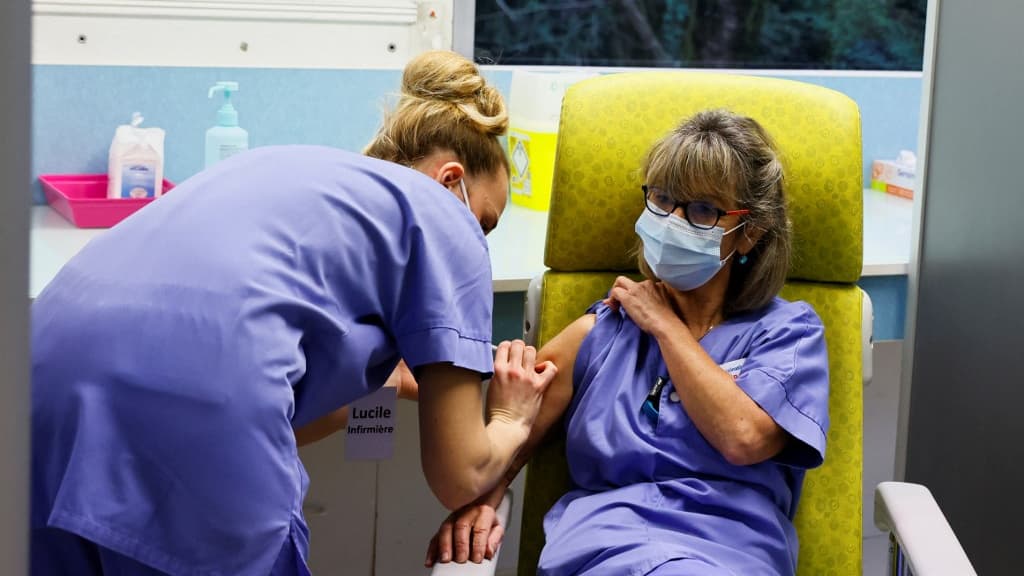Adverse effects, limited or even no efficacy against the South African variant … in French hospitals, some healthcare professionals are skeptical of the AstraZeneca vaccine.
All caregivers can, since February 6, receive a first dose of AstraZeneca vaccine against Covid-19. “This will allow us to accelerate the pace of vaccination”, rejoiced Jean Castex at the beginning of the month, hoping thanks to this to reach “the objective of 4 million people vaccinated by the end of February” .
But some health professionals are reluctant to face the British vaccine, 28 million doses of which have been ordered by the government by the summer. While cheaper and less restrictive to keep, Astrazeneca’s vaccine is 60% effective.
A few disorganized hospitals
Last week, some hospitals were forced to suspend injections of the vaccine because of the strong side effects on caregivers, such as those in Brest or Morlaix in Brittany, according to our colleagues from the Telegram. In Brest, between 20 and 25% of vaccinated caregivers went on sick leave due to flu-like symptoms such as fever, body aches or headaches.
“It’s a good vaccine,” reassured Professor Alain Fischer, chairman of the advisory board for the vaccine strategy Monday morning on BFMTV. “We were a little spoiled by the fact of having two vaccines with an estimated level of protection of over 90%, but it’s still a very good vaccine and you have to use it.”
However, he recommended to prefer the Moderna and Pfizer vaccines for caregivers in Moselle, where the South African variant circulates, because “they make it possible to acquire immunity more quickly”.
Caregivers “subjected to high viral loads”
For others, the problem with the AstraZeneca vaccine is not its predictable and non-serious side effects, but rather its percentage of effectiveness. On BFMTV this Monday evening, Dr Jérôme Marty, president of the French Union for Free Medicine, called for “not vaccinating caregivers with this vaccine”, which should rather “be kept for young people, in good health. health, and little risk “.
“Targeting caregivers with this vaccine does not seem a good thing to us, to us doctors, it seems to us to be a waste of time when we need carers on the bridge”, he declared on our antenna. “The whole problem is the benefit-risk”, explains the general practitioner.
“We are far from the idea of monopolizing Pfizer vaccines reserved for the elderly, but we know that this vaccine (that of AstraZeneca, ndlr) is ‘less efficient’ than that of Pfizer / BioNTech or Moderna. However, there are specificities for caregivers, in particular that of their exercise “.
First of all, according to him, health professionals “are subjected to high viral loads, so they need the most effective vaccine. We are brought to meet the virus several times a day in the services. We must therefore benefit from the strongest protection in order to be with our patients “.
Then, he continues, “if a caregiver is vaccinated with this vaccine, it will not prevent him from transmitting the disease to the patient. Very often in care establishments, the pathology is transmitted through the caregivers, c This is what is called a nosocomial infection, but this vaccine does not or very little reduce contagiousness. It is therefore not the most effective for that “.
“Limited protection” against the South African variant
Finally, the British vaccine “is not effective on the South African variant,” says the doctor. A study published on February 7 affirms that this vaccine offers “limited protection against moderate forms of the disease caused by the South African variant in young adults”. However, “caregivers will necessarily have to meet the South African variant”.
An opinion shared by the doctor Ludovic Toro, spokesperson for the C19 healthcare collective. Asked about our platform Monday evening, the UDI mayor of Coubron (Seine-Saint-Denis) considers it risky to vaccinate health professionals with this vaccine less effective than the first two authorized on the market. He wonders: “We already do not have enough caregivers in France, if in addition they fall ill, what are we going to do? There will be no one left to treat”.
Benjamin Davido, infectious disease specialist at Raymond Poincaré hospital in Garches (Hauts-de-Seine), interviewed by The Parisian, he also judged “inadmissible to vaccinate caregivers with a product perhaps less effective, since the virus still circulates a lot”.
“If tomorrow we, caregivers, get sick, there will be fewer doctors and nurses in the wards while we have the lives of patients in our hands,” he lamented.
In accordance with the recommendations of the High Authority for Health, the AstraZeneca vaccine is not recommended for the elderly but for all healthcare professionals and for people aged 50 to 65 years. People in these population groups with comorbidities should be given priority.
—


